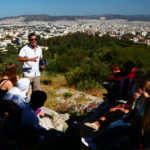
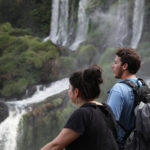
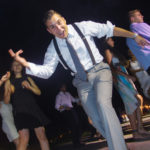
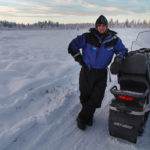
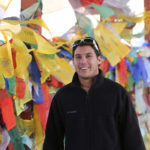 In his new nomadic role, he finds education everywhere … literally. A curriculum developer for Think Global School (TGS), Martino scours the planet, diving headfirst into one culture after the other and finding ways to bring students along. His lessons cover the basics – English, math, science, and more – but textbooks and whiteboards give way to real life, taking the experiential learning he discovered at Mary Washington to the extreme.
Think salsa lessons in Argentina, ice fishing in Sweden, safari in Tanzania.
“We’re kind of like this tech start-up of the education world,” Martino said of TGS, an independent traveling high school, where students from everywhere – the U.S., India, Afghanistan – live and learn in 12 countries over the course of three years using a curriculum that develops them into global citizens empowered to make change.
Growing up with a diverse group of friends on New York’s Long Island, Martino soaked up the surf and the sun, along with an appreciation for varied perspectives and backgrounds. He brought that mindset to college, where he majored in history and secondary education, and played lacrosse. But Mary Washington had not been solidified as his college choice until he toured campus and saw students gathered at the fountain in front of Monroe Hall.
“I thought, ‘This is exactly what college looks like in my brain. This is where I want to be.’ ”
His encounters with professors confirmed his choice. A differentiated instruction class with then-Assistant Professor of Education Thomas Fallace “flipped things on their heads,” Martino said. UMW Philharmonic Orchestra Director Kevin Bartram shared a life-changing mantra: With energy and confidence, you can do anything. And Professor of Education Venitta McCall? She blew him away.
“I would find myself in her office chatting about the state of education and the difference I wanted to make,” Martino said. “She was a big proponent of me following my passions.”
At Mountain View, his first job after graduation, he taught history, launched a popular international baccalaureate anthropology course, and searched for ways to engage students. A Civil War lesson, for example, might find them marching like soldiers – “from Gettysburg to Antietam” – across the school parking lot.
The Washington Post’s prestigious 2011 Agnes Myer Outstanding Educator Award sent Martino speaking across the country and steered him toward TGS, where he taught global studies, before switching to curriculum development this summer.
His pupils study The Odyssey on a boat bound for Ithaca, Greece; ride camels across the Omani desert to learn about Bedouins; ponder poverty while spending time in a slum in Mumbai, India. Martino’s upcoming lesson plans have them tracking animals in Botswana and meeting A-bomb survivors in Hiroshima. All the while, students develop, debate and defend projects that offer real-world solutions.
Martino’s respect for place-based learning is personal. His first big expedition, back when he was working at Mountain View, was to Yei, South Sudan, on the heels of the horrific Darfur genocide. The trip, which brought him face-to-face with orphans, gunfire, and the slaughtering of a cow, helped form his approach to anthropology.
“That was by far one of the most incredible, life-changing experiences I’ve ever had,” said Martino, who’s pursuing a master’s degree in education – with concentrations in curriculum design and digital teaching and instruction – at the American College of Education.
He’s stayed connected to his alma mater, coaching lacrosse for years after he graduated and maintaining his friendship with fellow Mary Washington grad, Shin Fujiyama ’07, founder of Students Helping Honduras. The nonprofit Fujiyama launched at UMW helps empower the people of the Central American country.
“We both have this work ethic that makes us stand out,” said Martino, who took the first group of U.S. high-schoolers – from Mountain View – to visit his friend’s Honduran home base. “You think you know what poverty is, but until you get to a place like Honduras, you don’t.”
This fall, Martino partnered with another UMW alum, Sage Shaw ’04, in Bilbao, Spain, where Shaw is completing her MBA at the Universidad de Deusto. The two worked together to develop a module on Basque identity.
“What he does is fascinating,” Jose Sainz, Director of UMW’s Center for International Education and Associate Professor of Spanish, said of Martino. “He uses technology, global engagement … everything.”
It’s a demanding job that keeps him hopping from one hotel to another and away from his San Francisco home for months at a time.
For Martino, it works.
“You’re choosing to give up your personal life to be a bigger part of the student’s life,” he said. “For me, I get all of my energy from that.”
In his new nomadic role, he finds education everywhere … literally. A curriculum developer for Think Global School (TGS), Martino scours the planet, diving headfirst into one culture after the other and finding ways to bring students along. His lessons cover the basics – English, math, science, and more – but textbooks and whiteboards give way to real life, taking the experiential learning he discovered at Mary Washington to the extreme.
Think salsa lessons in Argentina, ice fishing in Sweden, safari in Tanzania.
“We’re kind of like this tech start-up of the education world,” Martino said of TGS, an independent traveling high school, where students from everywhere – the U.S., India, Afghanistan – live and learn in 12 countries over the course of three years using a curriculum that develops them into global citizens empowered to make change.
Growing up with a diverse group of friends on New York’s Long Island, Martino soaked up the surf and the sun, along with an appreciation for varied perspectives and backgrounds. He brought that mindset to college, where he majored in history and secondary education, and played lacrosse. But Mary Washington had not been solidified as his college choice until he toured campus and saw students gathered at the fountain in front of Monroe Hall.
“I thought, ‘This is exactly what college looks like in my brain. This is where I want to be.’ ”
His encounters with professors confirmed his choice. A differentiated instruction class with then-Assistant Professor of Education Thomas Fallace “flipped things on their heads,” Martino said. UMW Philharmonic Orchestra Director Kevin Bartram shared a life-changing mantra: With energy and confidence, you can do anything. And Professor of Education Venitta McCall? She blew him away.
“I would find myself in her office chatting about the state of education and the difference I wanted to make,” Martino said. “She was a big proponent of me following my passions.”
At Mountain View, his first job after graduation, he taught history, launched a popular international baccalaureate anthropology course, and searched for ways to engage students. A Civil War lesson, for example, might find them marching like soldiers – “from Gettysburg to Antietam” – across the school parking lot.
The Washington Post’s prestigious 2011 Agnes Myer Outstanding Educator Award sent Martino speaking across the country and steered him toward TGS, where he taught global studies, before switching to curriculum development this summer.
His pupils study The Odyssey on a boat bound for Ithaca, Greece; ride camels across the Omani desert to learn about Bedouins; ponder poverty while spending time in a slum in Mumbai, India. Martino’s upcoming lesson plans have them tracking animals in Botswana and meeting A-bomb survivors in Hiroshima. All the while, students develop, debate and defend projects that offer real-world solutions.
Martino’s respect for place-based learning is personal. His first big expedition, back when he was working at Mountain View, was to Yei, South Sudan, on the heels of the horrific Darfur genocide. The trip, which brought him face-to-face with orphans, gunfire, and the slaughtering of a cow, helped form his approach to anthropology.
“That was by far one of the most incredible, life-changing experiences I’ve ever had,” said Martino, who’s pursuing a master’s degree in education – with concentrations in curriculum design and digital teaching and instruction – at the American College of Education.
He’s stayed connected to his alma mater, coaching lacrosse for years after he graduated and maintaining his friendship with fellow Mary Washington grad, Shin Fujiyama ’07, founder of Students Helping Honduras. The nonprofit Fujiyama launched at UMW helps empower the people of the Central American country.
“We both have this work ethic that makes us stand out,” said Martino, who took the first group of U.S. high-schoolers – from Mountain View – to visit his friend’s Honduran home base. “You think you know what poverty is, but until you get to a place like Honduras, you don’t.”
This fall, Martino partnered with another UMW alum, Sage Shaw ’04, in Bilbao, Spain, where Shaw is completing her MBA at the Universidad de Deusto. The two worked together to develop a module on Basque identity.
“What he does is fascinating,” Jose Sainz, Director of UMW’s Center for International Education and Associate Professor of Spanish, said of Martino. “He uses technology, global engagement … everything.”
It’s a demanding job that keeps him hopping from one hotel to another and away from his San Francisco home for months at a time.
For Martino, it works.
“You’re choosing to give up your personal life to be a bigger part of the student’s life,” he said. “For me, I get all of my energy from that.”